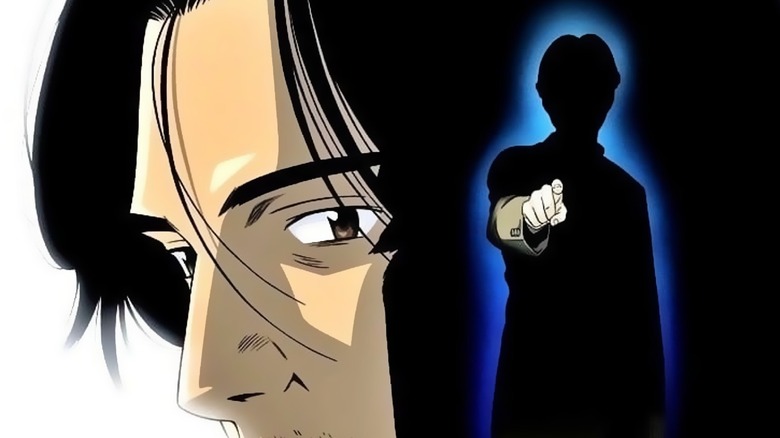
(Welcome to Ani-time Ani-where, a regular column dedicated to helping the uninitiated understand and appreciate the world of anime.)
What comes to mind when you think of prestige TV dramas? Is it '80s cop shows like "Hill Street Blues" or gritty anti-hero tales like "Breaking Bad" and "The Sopranos"? What about gripping thrillers like "Broen," or "Broadchurch" or even recent genre fare like "Hannibal" and "Game of Thrones"? We tend to associate this concept, regardless of country of origin or language, or even genre, with live-action.
To be fair, as varied and as popular as anime is, it is true that the vast majority of the big-name anime shows airing season to season are mostly genre shows aimed at teenage boys — not unlike how the biggest movies are genre movies also aimed at teenage boys. Sure, there are dramas, rom-coms, and plenty of slice-of-life shows, but it is extremely rare for anime to either star adult characters, deal with adult subjects and stories, or to even have a more methodical and serious tone. But what if I were to tell you there are alternatives? That there are shows with the methodical approach, the slow burn, the twists and turns, the character drama of an HBO show, it just happens to be animated? Welcome to Naoki Urasawa's "Monster."
The show takes place in West Germany during the Cold War, and follows Japanese doctor Kenzo Tenma, a prodigy brain surgeon who, tired of the hospital's politics, decides not to save the mayor of the city, but a young boy. This decision results in Tenma becoming the prime suspect in a murder investigation and the target of a serial killer.
From there, "Monster" becomes a brilliantly plotted and executed riff on "The Fugitive," a cat-and-mouse game between Dr. Richard Kimble and Hannibal Lecter.
What Makes It Great
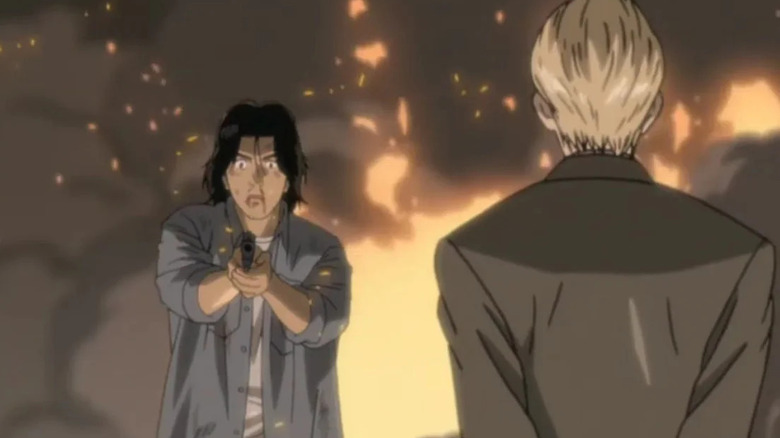
The first thing to know about "Monster" is that it is a slow burn. Those accustomed to fast-paced, action-packed shonen anime may be discouraged by the methodical approach to the story here, but it all makes for a fascinating experience. Tatsuhiko Urahata's scripts strike a good balance between the serialized and the episodic, stepping back from the main plot to flesh out the world while also carefully threading an intricate web of simultaneous stories that deepen the lore and the characters.
For the first third of the 74-episode show, Tenma roams around Germany while running from the cops, with little one-off stories of the good doctor hiding somewhere, until his better nature forces him to reveal himself in order to aid someone in need. Then, we may spend a good 10-15 episodes with an entirely new cast of characters, before tying it all together to the story of the titular monster, Johan. This makes "Monster" a perfect show both for the binge-watching era of TV, but also a great show to experience slowly and in chunks, as this show required your undivided attention or you'll miss out on the smaller details that make the plot so memorable and unique.
It is uncommon for anime to be set in real countries (other than Japan), but the way the team at Studio Madhouse faithfully recreates the minutiae of post-War Germany and Czechoslovakia, the streets, the food, the scenery, the people, is astonishing. "Monster" also grounds its story in a historical context, with references to the fall of the Berlin Wall, the end of communism in Czechoslovakia, neo-Nazi attacks on houses inhabited by Turks, and kindergartens with experiments on kids. All of this informs the story and make for a more impactful story rooted in the real world.
Grounded Characters And Great Villains
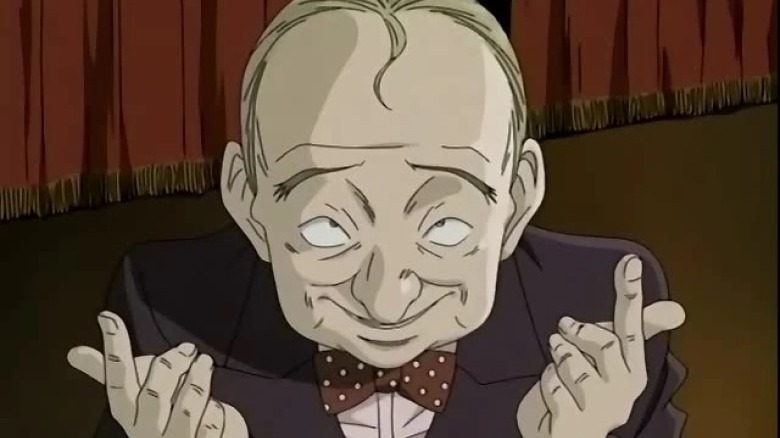
Now, "Monster" is not a flashy show. As mentioned, there are no over-the-top fight scenes (though there are plenty of gunfights), and the animation is more practical than flashy, but Masayuki Kojima and the team at Madhouse put emphasis on character expressions, resulting in some of the best-animated performances on TV. It helps, too, that the character designs for "Monster" are unlike most shows out there.
Like Naoki Urasawa's manga, the characters in this show don't have spiky or colorful hair; they don't have big eyes and there is no teenager covered in muscles and tattoos (I'm looking at you, "Tokyo Revengers"). Instead, all the characters look like real people, with flaws and imperfections, like double chins, large noses, bald spots, big bellies, and short stature. Even when we meet stranger characters like The Baby, who looks like The Arm from "Twin Peaks" are not portrayed to be caricatures, but regular people you could see in the real world — which helps the show have a quasi-live-action feel to it, and be perfect for an adaptation.
Of course, every good thriller needs a villain, and "Monster" boasts one of the greatest and most despicable villains in fiction, regardless of genre and medium. Johan is more than just a serial killer, he is more than a cold and calculating mastermind like Hannibal Lecter, or a seemingly important and omnipotent being like The Shape in "Halloween." Johan is this show's version of the Antichrist, and it is a testament to the writing in "Monster" that we rarely see Johan in the flesh, but always feel his evil hands setting things in motion.
What It Adds To The Conversation
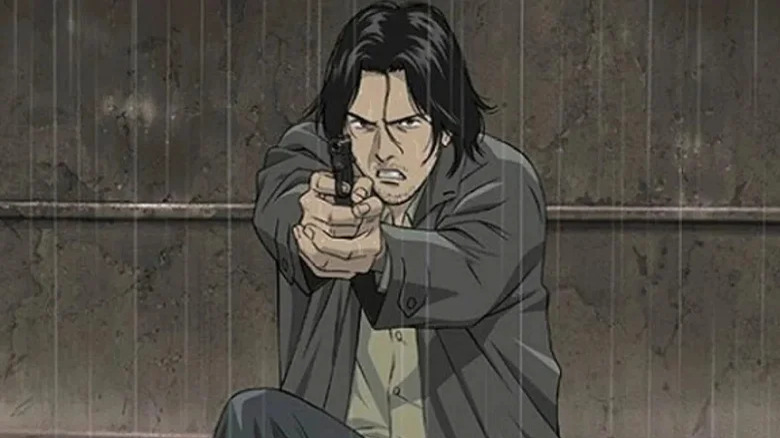
The most interesting thing about "Monster" is how much importance Urasawa places on names. Throughout the course of the story, we learn of experiments that erased people's names in order to shape them anew, and it becomes clear that names are integral parts of our identity, and neither is an isolated concept. Our names, the things that identify us, are a social contract, an acknowledgment by the people who surround us.
Johan, whose very name was taken for him as a child, is called different names by his subordinates, because they see him as different things, but never as his real self, because he has no real sense of self or of identity. His greatest non-killing crimes are specifically isolating individuals and killing those close to them until no one remembers their names. "Hell is where no one has a name. Say my name to prove that I existed," a character says in the show, and that seems to be the core thesis of "Monster." Just look at Tenma, who is on a crusade throughout the show to murder Johan despite that being a betrayal of what a doctor represents.
No matter how much he tries to get rid of his identity as a doctor, he cannot avoid helping others in need, and everywhere he goes, regardless of whether people identify him as a suspected killer or a wanted man, always call him "Dr. Tenma," because that's his identity, and he can never get rid of his principles as a doctor.
Who Is The Real Monster?
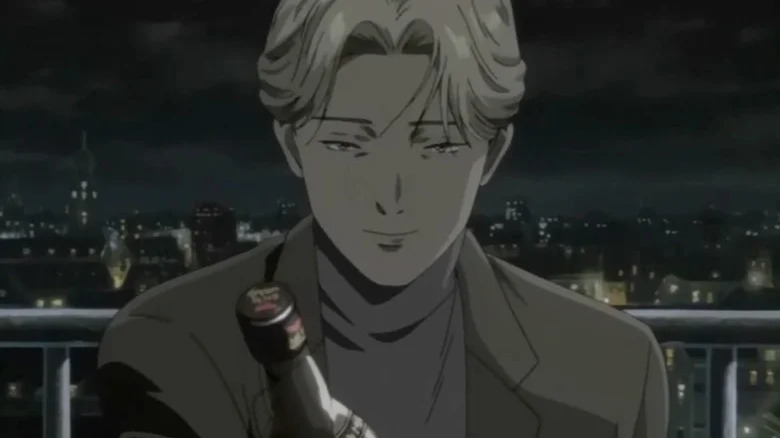
It probably won't surprise you to learn that a big theme in "Monster" is the idea of nature versus nurture. It may be a bit of a tired trope to give enough development and backstory to a villain to get the audience to sympathize with their circumstances, but this anime manages to make that theme feel fresh and poignant. "Who is the monster?" is a question pondered by several characters throughout the story, as the aforementioned human experiments and the mix of hopeful optimism of the end of the Cold War mixed with the violent chaos of the fall of the Soviet Union create the perfect circumstances for people's inner demons to come out.
The message of the show: humans can become whatever they want, and even if it often feels like "Monster" is a deeply nihilistic and dark story about the evils of humanity, it also shows time and time again that people can overcome the biggest traumas. "Sadness fades away and only happy memories remain," a character says in the series finale, and it is true. No matter how dark this show gets, no matter how often it makes you wonder if humanity has a future, along comes Dr. Tenma and the many, many people he touched with his kindness to prove that there is reason to be optimistic.
Why Non-Anime Fans Should Check It Out
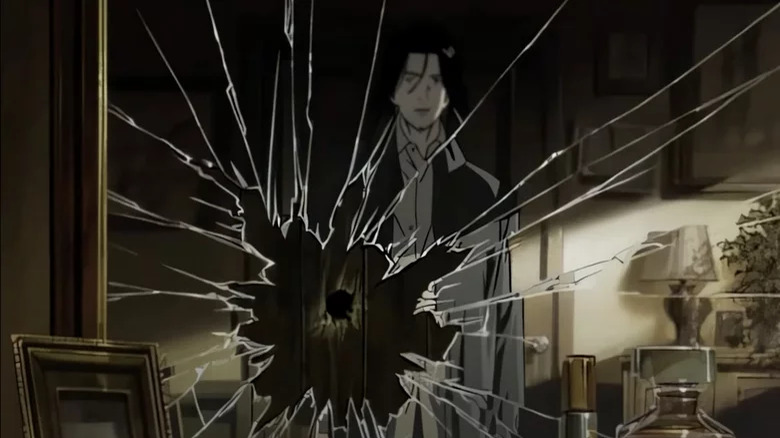
Whether you're a hardcore anime fan wanting something different, or someone completely new to the medium who wants a taste of what anime can do while sticking close to the kind of prestige TV dramas that are considered the best of the medium, "Monster" is worth a try. This is a show with a serious tone, well-fleshed-out characters, and a realistic and grounded story (even if it takes wild turns). None of the tropes or the aesthetics normally associated with anime that may turn off newcomers are here, like wild hair, cartoony designs, and over-the-top stories.
"Monster" is also just a fantastic thriller, a gripping cat-and-mouse game with one of the greatest anime villains of all time, and one of the best ensembles in a TV show ever. Plus, after you finish, you can also lament the Guillermo del Toro HBO adaptation that never was.
Watch This If You Like: "The Fugitive," "Hannibal," "Death Note.""Monster" is streaming on Netflix.
Read this next: 14 Anime Shows To Watch If You Love My Hero Academia
The post Monster Is Anime's Answer to a Prestige TV Drama appeared first on /Film.
from /Film https://ift.tt/XWDvTaY


No comments:
Post a Comment